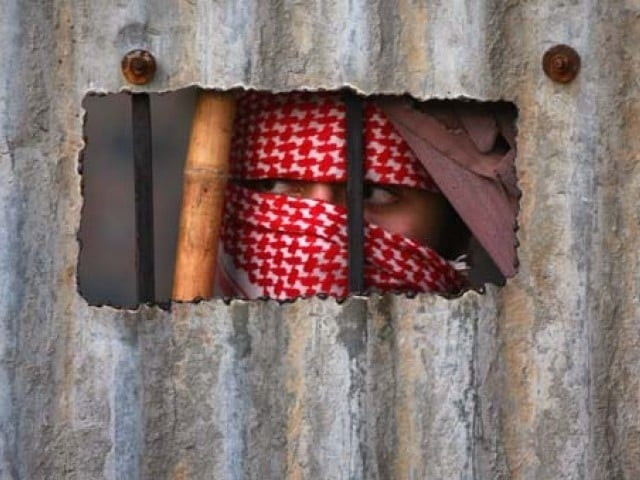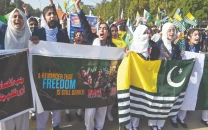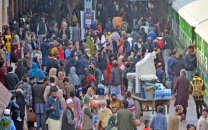Dialogue with the US: Afghan Taliban share ‘peace’ blueprint with Pakistan
Militia also updates Haqqani network on US contacts.

The Afghan Taliban have shared with Pakistan the ‘functional blueprint” of their formal talks with US officials in the Gulf state of Qatar, an Afghan leader told The Express Tribune on Tuesday.
It is possibly the first time that the Taliban have shared details of what they will be discussing with US negotiators, even though they haven’t divulged what had been previously discussed.
“The Taliban have asked Pakistan to point out if it has any objection to the issues they have prioritised for talks with the US,” the Afghan leader, privy to the developments, told The Express Tribune.
The Taliban have also updated the Haqqani network, the deadliest of all Taliban factions, on the round of dialogue with the US and the future plan, he said.
Dr Nasiruddin Haqqani, the elder brother of Sirajuddin Haqqani, recently travelled to the United Arab Emirates and met with the top Taliban negotiator, Tayyeb Agha, to apprise him of the Taliban-US interaction.
“Nasiruddin could not travel to Qatar for some reason and went to Dubai to meet with Agha,” the Afghan leader said, adding that Agha flew to Dubai to meet with the Haqqani network leader. The Afghan leader, who requested not to be identified, met Nasiruddin on his return from Dubai.
The Afghan leader did not confirm media reports about the release and subsequent repatriation of some Taliban prisoners from the US detention centre at Guantanamo Bay. He claimed that a senior Qatari official is also playing an important role in the talks.
However, he said, Taliban negotiators have asked for the release of several key Taliban prisoners from Guantanamo, Bagram, Pul-i-Charkhi and other prisons who would be part of ‘formal negotiations’.
Former Taliban ambassador to Pakistan Mullah Abdul Salam Zaeef voiced support for the US-Taliban talks but strongly opposed the involvement of ‘neighbouring countries’ in the process.
“If Pakistan is involved in the talks, then Iran, India and other neighbours will also want to have a say in the process. Afghans cannot afford such rivalries. Afghans must make decisions independently and all countries should extend diplomatic support to the Afghan peace process,” Zaeef told The Express Tribune by phone from Kabul on Tuesday.
“Afghans are passing through a difficult phase and if other countries enter the dialogue process at this stage, then the process would not produce tangible results,” Zaeef added. At the same time, he said, Afghans expect the peace process to move forward.
Qatar will also soon send a delegation to Kabul to try and win over the Afghan authorities, who have expressed strong reservations about the ‘secret US-Taliban talks’. In December last year, the Afghan High Peace Council had announced it would send a delegation to Qatar -- but nothing has been heard from them ever since.
President Hamid Karzai, in his recent speech to the Afghan parliament, again expressed his government’s desire that a Taliban office be opened either in Saudi Arabia or Turkey.
Taliban spokesman Zabihullah Mujahid, in a brief email, confirmed to The Express Tribune that his group had formally opened a liaison office in the Qatari capital but did not share details.
Like Afghanistan, Pakistan is also not happy with US efforts to bypass it in the Afghan peace process. “I believe Pakistan is aware of the developments in Qatar but has not been given a complete picture of the talks,” an Afghan diplomat told The Express Tribune.
After being ignored in the Qatar dialogue process, top Pakistani and Afghan leaders recently agreed to revive their joint peace efforts, stalled in the wake of the September assassination of top Afghan peace negotiator Burhanuddin Rabbani, the diplomat said.
He said Pakistan has proposed that President Hamid Karzai travel to Islamabad while the Afghan government wants President Asif Zardari or Prime Minister Yousaf Raza Gilani to visit Kabul.
Islamabad and Kabul argue that Doha is not a suitable place for a Taliban political office for several reasons. They argue that Qatar is a small country in the Islamic world and that many Islamic countries, including Saudi Arabia, Turkey and Iran, are opposed to this venue for the Taliban office. Despite repeated attempts by The Express Tribune, the Foreign Office spokesperson could not be reached for comments.
(Read: Seeking clarity within confusion)
Published in The Express Tribune, January 25th, 2012.



















COMMENTS
Comments are moderated and generally will be posted if they are on-topic and not abusive.
For more information, please see our Comments FAQ